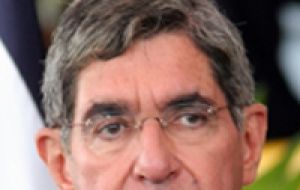MercoPress. South Atlantic News Agency
Costa Rica calls for recognition of Honduras Sunday elections results
 Peace Nobel Prize Arias appeals to “common sense” and the vulnerability of Honduras and its economy
Peace Nobel Prize Arias appeals to “common sense” and the vulnerability of Honduras and its economy Costa Rica president Oscar Arias, who mediated in the Honduran political crisis, announced his country would recognize the winner of next Sunday’s election and called on other countries to follow in statements to CNN.
“Why should not punish them (Hondurans) with a second Mitch hurricane, which would be not recognizing the new government; why isolate them; why deny them cooperation? insisted Arias calling for an end to sanctions imposed on Honduras, as long as elections develop in a clean and guaranteed manner for all voters and parties.
“At the end of the day, common sense should prevail, and common sense tells us that if all evolves normally” next Sunday; “the majority of world countries should recognize the election and its results” insisted the Peace Nobel Prize winner.
Arias mediated between ousted president Manuel Zelaya and the head of the de facto government Roberto Micheletti following the June 28th coup, proposing among other options the so called San Jose Accord calling for the reinstatement of Zelaya which never happened.
This way Costa Rica sides with Panama and the United States, the few countries that have anticipated they will recognize the winner of Sunday’s presidential election in which candidate Porfirio Lobo from the conservative National Party is leading comfortably, according to the latest public opinion polls released before the electoral activity ban.
An estimated 4.6 million Hondurans are registered to vote on Sunday to elect a new president, three vice-presidents, the 128 members of the one house Congress and municipal authorities that will remain in office for four years until 2014.
Meantime Honduras Electoral Tribunal reported that virtually 99% of all election material for Sunday’s ballot had been distributed and no incidents had been reported.
Armed Forces spokesman Colonel Ramiro Archaga said that in coordination with police forces “we have taken all necessary measures to guarantee the security of voters, stability on voting day and no surprise either on Saturday or Sunday”.
Police forces spokesperson Orlin Cerrato said patrolling had been increased in Tegucigalpa and called on all Hondurans not to feel scared or threatened by “unscrupulous agitators who want to boycott the elections when we all want to vote on Sunday and get over with this situation”.
Ousted Zelaya, holed at the Brazilian embassy, and the popular resistance who want his reinstatement are calling on boycotting the election but anticipated they “are appealing to peaceful means, we are not promoting violence”.
Most of the international community and multilateral organizations do not recognize the de facto Honduran government and have anticipated they will not support Sunday’s elections results.
Brazil which leads Latinamerican countries insistent in the reinstatement of Zelaya before accepting Sunday’s election (so as not to “legitimize” the coup) has clashed with the US policy “of giving the election a chance to help a way out to the political crisis”.
Honduras with Haiti and Nicaragua are the poorest countries in Latinamerica and the Caribbean. Foreign aid direct and in the form of trade benefits is crucial for the Honduran economy whose national budget is half financed through donations.




Top Comments
Disclaimer & comment rulesCommenting for this story is now closed.
If you have a Facebook account, become a fan and comment on our Facebook Page!